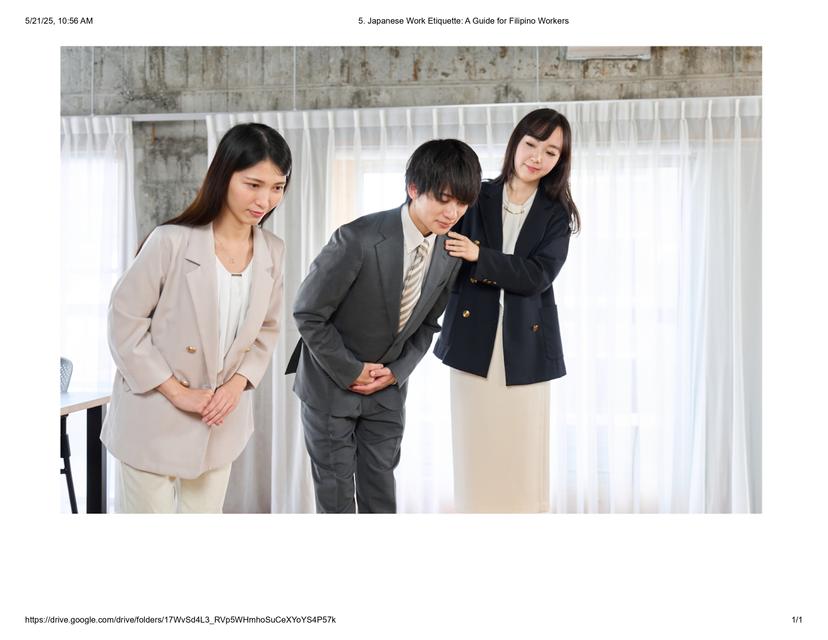Travel and Recreation
Survival Tips for OFWs in Japan: Culture, Dos and Don'ts

Working in Japan as an Overseas Filipino Worker (OFW) can be an exciting and rewarding experience, but adapting to a new culture is important. To help you settle in smoothly, here’s a guide to the Japanese culture, some essential dos and don'ts, and tips for making your stay easier.
Understanding Japanese Culture
Japan is a country rich in tradition and modernity. Respect, politeness, and harmony are fundamental to the Japanese way of life. As an OFW, understanding these cultural norms will help you build good relationships with your Japanese colleagues, friends, and neighbors.
1. The Importance of Respect
Respect is a central value in Japanese society. Whether you’re interacting with superiors or peers, showing respect is crucial. Simple gestures like bowing slightly when greeting or thanking someone go a long way in demonstrating your respect.
Tip: Address people with their honorifics, such as "-san" after their name, as a sign of respect (e.g., “Tanaka-san”).
2. Politeness is Key
Politeness in Japan extends to every aspect of daily life. When speaking, always be courteous and avoid raising your voice or being overly expressive in public.
Tip: Always say “Sumimasen” (excuse me) when trying to get someone’s attention or when apologizing.
Dos and Don'ts in Japan
Being aware of cultural norms can make your experience in Japan smoother. Here are some important dos and don’ts for every OFW to know:
Dos:
1. Do remove your shoes before entering homes or certain indoor spaces. In many Japanese homes and some businesses, you’ll need to take off your shoes at the entrance to keep the interior clean. Always have clean socks and be prepared for this tradition.
Tip: If you’re invited to a home, you’ll often be given slippers to wear indoors.
2. Do bow when greeting others. Bowing is a traditional greeting that signifies respect. A slight bow is sufficient when meeting someone for the first time, but deeper bows can indicate deeper respect.
3. Do bring a gift when visiting someone's home. Offering a small gift is a common gesture of politeness. This doesn't have to be expensive but should be thoughtfully chosen.
4. Do use both hands when handing over money or gifts. Handing over things like money or a business card with both hands shows respect. This is especially true when interacting with older people or superiors.
5. Do learn basic Japanese phrases. While many Japanese people speak English, especially in larger cities, learning a few phrases in Japanese, like "Arigatou gozaimasu" (thank you), will go a long way in making a good impression.
Don'ts:
1. Don’t tip. Tipping is not a part of Japanese culture and can even be seen as rude. Exceptional service is already included in the price, and tipping can make workers uncomfortable.
2. Don’t point or gesture aggressively. Pointing at people or things is considered impolite in Japan. It’s better to gesture with your whole hand, keeping your fingers together.
3. Don’t engage in public displays of affection. Public displays of affection, such as kissing or holding hands in public, are considered inappropriate in Japanese culture. It’s important to be mindful of your actions, especially in public spaces.
4. Don’t speak loudly in public places. In Japan, people generally speak in soft tones. Speaking loudly on public transportation or in public spaces can disturb others, so be mindful of your volume.
5. Don’t tip your food servers or taxi drivers. As mentioned earlier, tipping is unnecessary and may even be viewed as an insult. Show appreciation through words and respect instead.
Navigating the Workplace
If you’re working in Japan, the following tips will help you adapt to the workplace culture:
Work ethic: Japanese workers are known for their strong work ethic, punctuality, and dedication. Be on time, show commitment to your job, and be prepared to work as a team.
Hierarchy: Japanese workplaces are often hierarchical. Respect for seniority is important, so always be mindful of who your seniors are and follow their instructions respectfully.
Group harmony (Wa): The concept of "wa," or harmony, is vital in the Japanese workplace. Avoid public confrontations or causing disruptions. Cooperation and teamwork are highly valued.
Dealing with Everyday Life in Japan
Dining Etiquette: When dining out, wait for everyone to be served before starting to eat. Don’t stick chopsticks upright into a bowl of rice, as this is considered disrespectful. Always place chopsticks neatly on the chopstick rest after using them.
Public Transport Etiquette: When using public transport, always queue up in an orderly fashion. Keep your phone on silent mode, and avoid speaking loudly while on the train or bus. Also, give up your seat for the elderly, pregnant women, or people with disabilities.
Trash Disposal: Public trash bins are rare in Japan, so be prepared to carry your trash with you until you find a designated place to dispose of it.
Cultural Insights and Fun Facts
Seasonal Festivals: Japan has a rich tradition of festivals (matsuri), which celebrate the changing seasons and local culture. Participating in these events can provide a deeper understanding of Japanese traditions.
Respect for Nature: Japanese culture places great emphasis on the beauty and respect for nature, as seen in the appreciation of cherry blossoms (sakura) in the spring.
Living and working in Japan can be an enriching experience, but respecting cultural norms and traditions is key. By following these dos and don’ts, you will not only avoid misunderstandings but also gain the respect of the people around you. Embrace the Japanese way of life with an open mind, and your stay in Japan will surely be rewarding!






